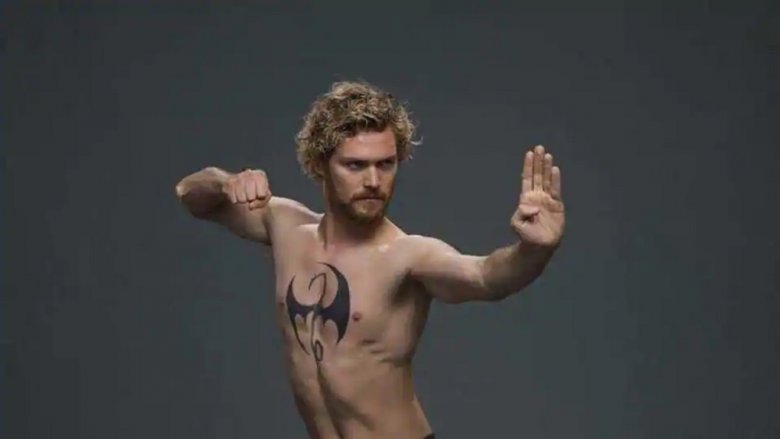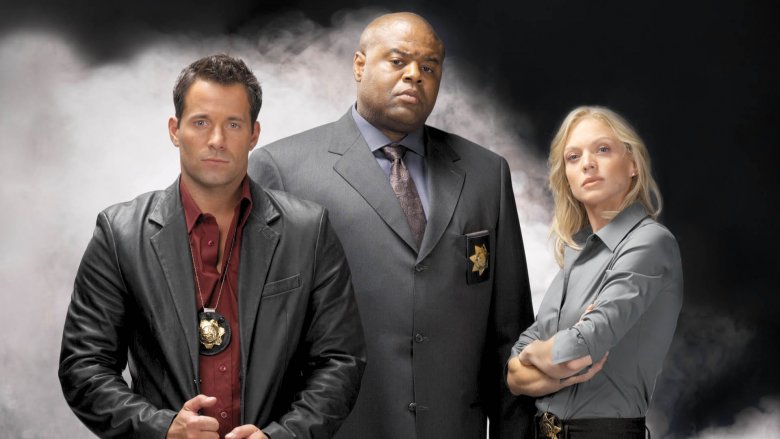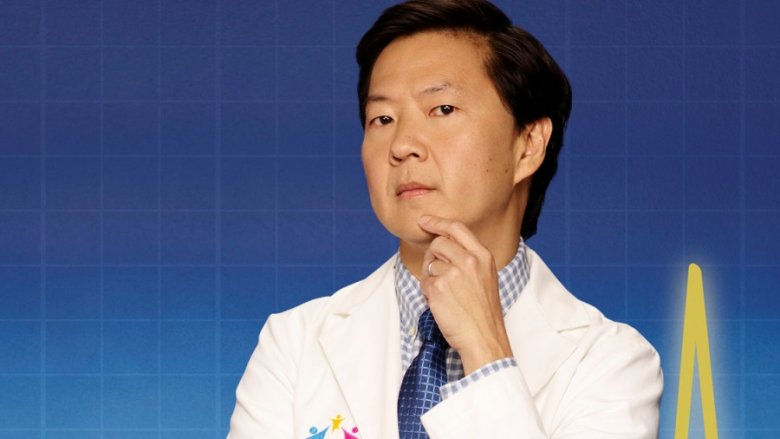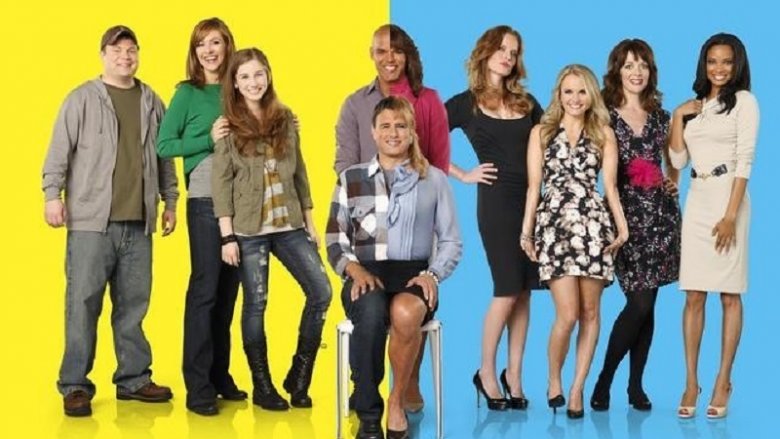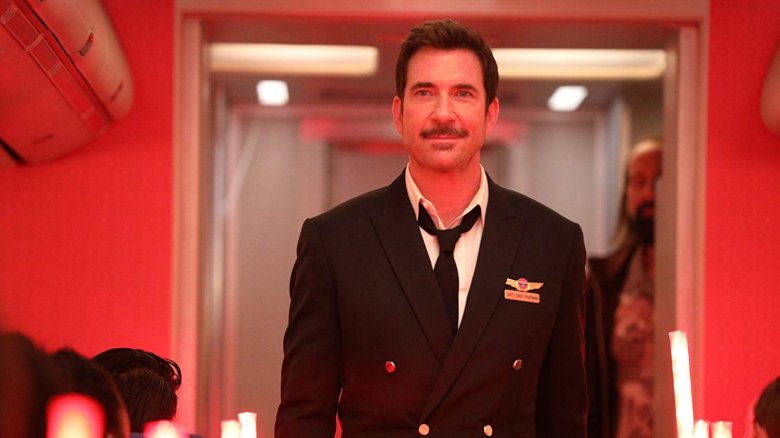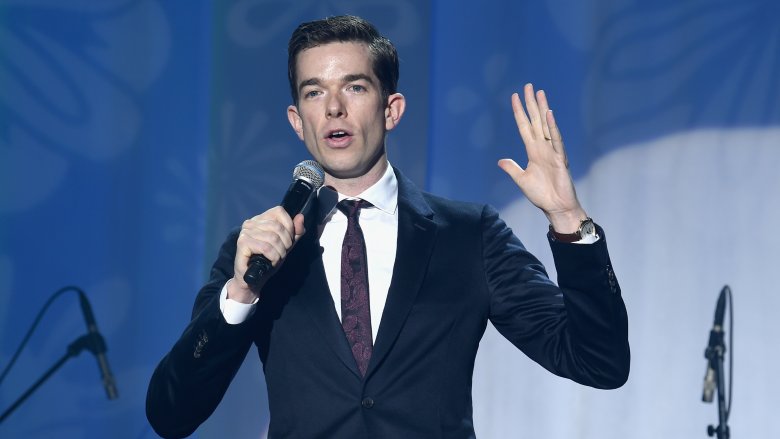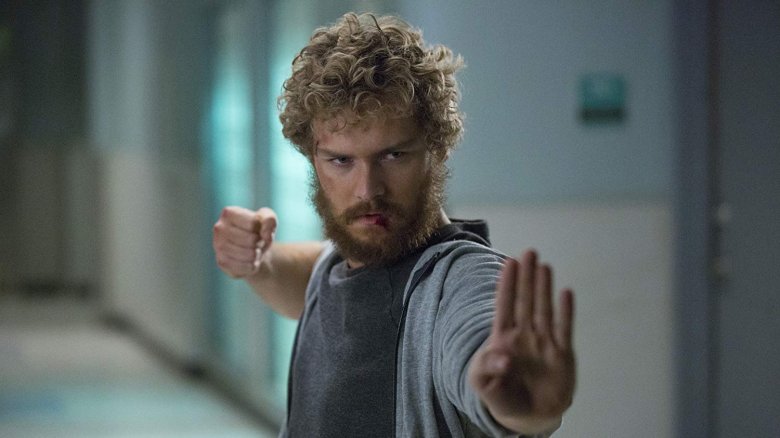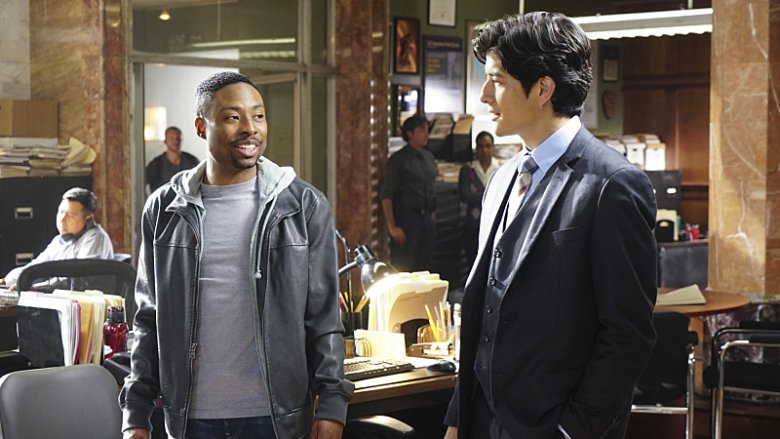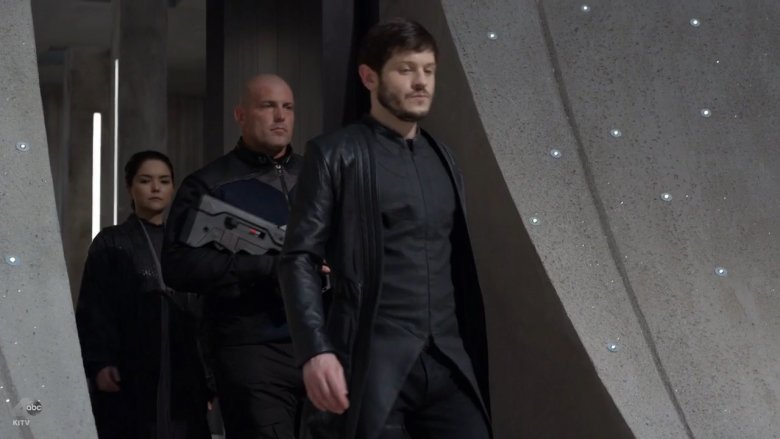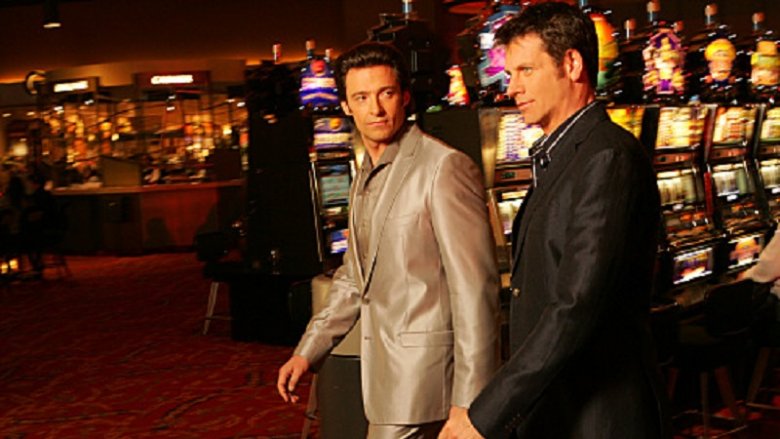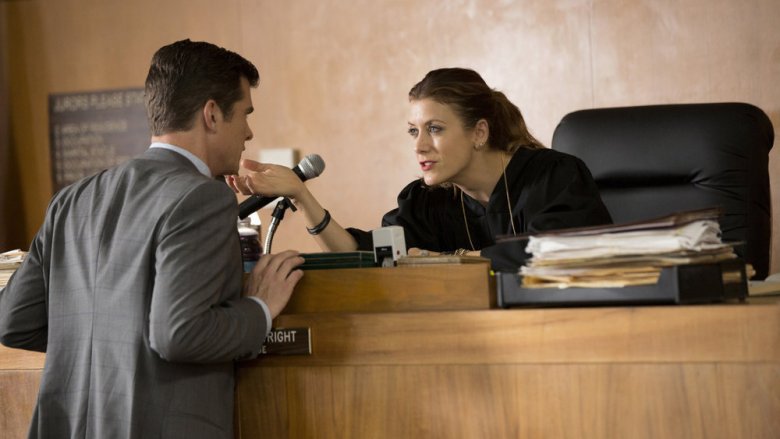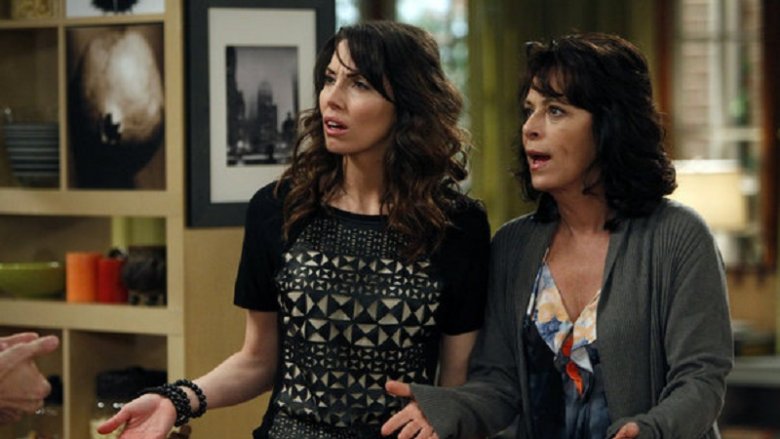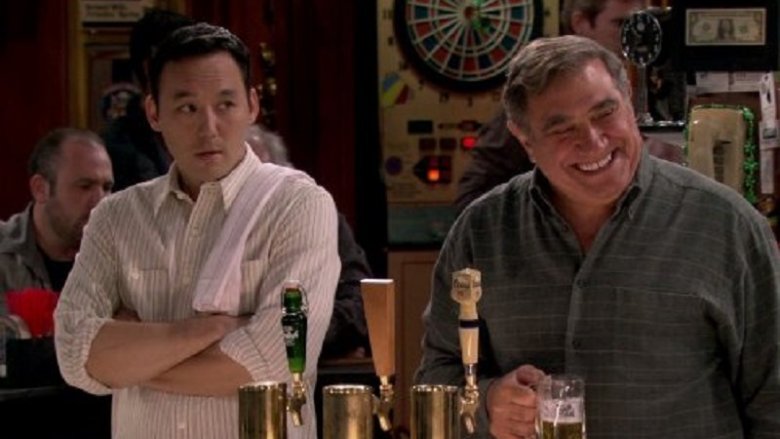TV Shows That Were Ruined By Bad Acting
Making a great television show is like putting together a great meal. It takes quality ingredients blending well to create something that appeals to a wide variety of tastes. Just like a kitchen creation, it can sometimes be easy to tell where things went wrong. An unappealing presentation can make it difficult to convince diners to give your cuisine a try.
Similarly, a television show with poor acting can undo the work of the producers, writers, and directors. Stiff, wooden action or delivery might be the sort of thing that helped make Mystery Science Theater 3000 a hit, but it usually doesn't bode well for the dramas and sitcoms that networks hope can anchor their lineups for years to come. But while television execs would like to forget some of these shows that bombed because of poor on-screen performances, we'd like to take a look back and see some of the ways things went wrong.
Killer Instinct (2005)
For nearly as long as there have been episodic television shows, there have been police procedurals. The formula is a simple one — the cops identify a crime, interview witnesses, investigate a list of suspects, and eventually apprehend the perpetrator. After so many years of having programs follow this checklist, it takes a pretty unique twist to stand out from the crowd. That's what Fox tried to do with Killer Instinct. The show focuses on the San Francisco Police Department's Deviant Crimes Unit, filling the show with particularly ghastly and grotesque murders. It's debatable whether that hook would have grabbed viewers and kept them coming back to the series long term, but it wasn't a surprise for a network that prided itself on having edgier programming than any of its competitors.
What didn't work for critics was the presence of lead detective Jack Hale, played by Johnny Messner. Messner was best known for his run as Rob Layne on Guiding Light and his guest appearances as Lance Baldwin on The O.C., but he'd also spent time playing a detective during the short-lived Tarzan TV series that ran for nine episodes in 2003.
Apparently, that wasn't enough time for Messner to hone his craft as a police investigator. His work in Killer Instinct was panned as "Jack Webb with better upper-body development" with a "performance that doesn't yield much heat, even when he's roughing up a suspect."
Dr. Ken (2015)
When an actor succeeds in supporting roles, it's not uncommon for that actor to find their way into a show of their own. It's also pretty common for that particular vehicle to be based on the off-camera life of the star. That was the case with Ken Jeong, who found his way to stardom with scene-stealing roles in Community and The Hangover. But before Jeong made us laugh on television and in the movies, he was a licensed medical doctor who earned his degree at the University of North Carolina.
So it made sense when Jeong had the chance to star in his own sitcom that it was built around his previous life as a physician. Thus, the world was introduced to Dr. Ken. Whereas in his other roles, Jeong was able to play more manic, edgy characters, Dr. Ken cast him as a wacky doctor and overprotective father but frequently relied on sitcom premises that, as reviews were quick to point out, relied on tired old jokes.
But it was more than just lazy writing that turned off the critics. Jeong's acting was criticized as being "wooden and completely lacking in credibility" although some surmised that Jeong's style of energetic, physical comedy might not have been well-served in a traditional three-camera format or within the confines of an ABC Friday night family comedy. Either way, the entire endeavor was a prescription for a quick cancellation.
Work It (2012)
The concept of men dressing in drag for television or movies isn't a new one. Go back to 1959's Some Like It Hot and you'll see Jack Lemmon and Tony Curtis donning dresses to evade the mob while secretly trying to court Marilyn Monroe. Dustin Hoffman put on a wig and a dress for 1982's Tootsie, while Tom Hanks got his first big break in the '80s sitcom Bosom Buddies. That's to say nothing of Tyler Perry's massive success in his Madea series.
In the midst of it all came Work It, an ABC comedy about Lee Standish (Ben Koldyke) and Angel Ortiz (Amaury Nolasco) trying to find jobs in the midst of a recession. The pair decide to pose as women in the hopes that it would open up more opportunities. Almost immediately, the show was roasted as being "low-brow," "wretched," and offensive to women.
Lest you think that all of the scorn toward the show was heaped upon the writers and the producers, the actors didn't escape criticism, either. One reviewer summed up the performances of the two leads by declaring, "I don't like them as women, and I don't like them as men. Game over." Judging by the show's 13-episode run, a lot of viewers may have felt the same.
LA to Vegas (2018)
The idea of mining comedy from travel isn't a new one. Shows like Taxi and Wings used the humor of employees and customers in various modes of transportation and found lasting success with audiences. Anyone who frequently travels for business is likely to recognize the quirks of navigating airports or using car services. Making fun of airlines has become a trope of stand-up comedy ("Airplane food, amirite?"). That's likely what led producers and executives at Fox to greenlight LA to Vegas.
As the title suggests, the show revolved around the crew of cut-rate Jackpot Airlines, whose route was the relatively short jaunt between the two destination cities. The show featured several recognizable actors, with Peter Stormare (Fargo, The Big Lebowski) among its regulars and Don Johnson (Miami Vice) making a cameo in one episode. On the whole, the acting didn't seem to offend reviewers' sensibilities as much as the jokes or the flimsy premise.
However, the show's star, Dylan McDermott, did not emerge unscathed. He was described as being "terribly miscast" in a role that forces him to take up "a performance style that doesn't work." Despite being executive produced by the team of Will Ferrell and Adam McKay and having the likes of Steven Levitan and Fred Savage directing episodes, LA to Vegas failed to get off the runway for a second season.
Mulaney (2014)
Any sports fan can tell you that not every great player can become a great coach... and vice versa. Similarly, being a great writer or stand-up comedian doesn't necessarily make you a great actor. Or maybe it's just a case of needing a little more seasoning. Either way, Mulaney didn't do much to make its star, John Mulaney, into more of a household name.
The baby-faced comic rose to prominence as a writer for Saturday Night Live before starring in several of his own stand-up specials. That led to NBC considering — and eventually passing on — a pilot based on Mulaney's life. After reworking the script, Fox picked up the show for a six-episode run. In the show, Mulaney plays an aspiring comedian who lands a job as a joke writer for a game show host, played by Martin Short. The series aped the style of Seinfeld, with Mulaney performing some of his standup bits — a point that didn't go unnoticed by critics.
Despite the acclaim Mulaney earned as a writer and comedian, his lack of experience as an actor was clear to reviewers, with one noting his "awkward and stiff" delivery. It probably didn't help that he was cast opposite the always-animated Short, whose over-the-top energy felt even more exaggerated by comparison. After 13 episodes, Fox decided that Mulaney would be no more.
Iron Fist (2017)
Few franchises have had the success of the Marvel Cinematic Universe. Nearly every film seems to set new box office records. Likewise, the company has had a solid run of bringing its stories to the small screen with Netflix hits like Daredevil, Luke Cage, and Jessica Jones. But not every Marvel property will automatically have a golden touch with viewers, as they learned with the debut of Iron Fist.
The story of Danny Rand, mystical Living Weapon and heir to a family fortune, was Marvel's next entry to its series of Hell's Kitchen heroes, all of which built up to the short-lived series The Defenders, which ran for eight episodes on Netflix. While some of the failures of The Defenders may have stemmed from audience fatigue with a growing cadre of interconnected series, it may also have had to do with a hero that never connected with viewers from the beginning.
It didn't take long for critics to point out the show's slow-moving storyline — something the showrunners tried to address in the second season. But that didn't seem to be enough to make up for the shortcomings of the show's lead. Finn Jones, who was better known in his role as Loras Tyrell on Game of Thrones, seemed unable to handle the demands of carrying the series. His work in Iron Fist was characterized as "so bland that it does little to perk up the often workmanlike proceedings."
Rush Hour (2016)
Sometimes, networks will play off the success of popular movies to find content for new television series. Fargo, Friday Night Lights, and Westworld are among the many television series that began life as silver screen features. Often, showrunners will try to move quickly and bring these ideas to television while the movie is still hot within the pop culture consciousness. Other times, network executives will reach back into the past and revive a once-popular property. Rush Hour was an example of the latter.
The film version of Rush Hour found success as a trilogy of action-comedy buddy cop movies starring Chris Tucker and Jackie Chan, with the final installment hitting theaters in 2007. The chemistry of the two leads went a long way toward securing the franchise's success... as did the fact that Tucker was at the height of his American box office popularity while Chan was one of the biggest film stars worldwide.
Nearly a decade after Rush Hour 3, CBS tried to reintroduce the characters of Carter and Lee with a pair of actors — Justin Hires and John Foo — who were virtual unknowns to television audiences. That was already one strike against the show. That likely led to the second great sin, a sin that one reviewer described as having actors that "feel like they are doing impressions of their predecessors."
Inhumans (2017)
Iron Fist marked Marvel's big misstep when it came to online streaming shows. But everything is great when it comes to their network offerings, right? After all, shows like Agents of S.H.I.E.L.D. continued to have solid ratings and a consistent fanbase. As it turns out, Marvel can occasionally be fallible in the network television space as well.
The story of Inhumans isn't quite as well-known outside of the most diehard of comic book geekdom, and when brought to the small screen, it was easy for many viewers to confuse it with a more popular set of Marvel characters that shared mutant traits. That wasn't the only connection between Marvel properties. Both Inhumans and Iron Fist credited Scott Buck as showrunner. Both shows also featured Game of Thrones alumni in key roles, with Iwan Rheon (better known as Ramsey Bolton) playing Inhumans antagonist Maximus.
It was a role that didn't sit well with one critic, who commented on Rheon's "stiff and exposition-heavy speeches." But he was not alone. Another reviewer noted that when some of the supporting characters deliver their lines, "you'll wonder just what exactly they're doing, and why." Not good.
Viva Laughlin (2007)
A continued trend in American television is borrowing and adapting ideas from British television. Shows like House of Cards, The Office, and American Idol were once programs that gained popularity in the United Kingdom before making their way to television airwaves in the United States. Yet not every British import finds success when it hits American shores.
Enter Viva Laughlin. The show won a Peabody Award for the BBC as Viva Blackpool — a musical comedy-drama about a murder in a casino. When the show made it to America, the setting was changed from Blackpool to Laughlin — the Nevada river town that has become a popular alternative to Las Vegas. That's not all that was different. While critics lauded the fearlessness of the performances in the BBC version of the show, its American counterparts didn't earn the same reaction.
According to one reviewer, the show was littered with "half-hearted melodic interludes awkwardly muttered by its stars." The critic took particular aim at star Lloyd Owen as "a man who couldn't sell a dance number to a drunk, rich Midwestern tourist." If it's any consolation to all of those involved in Viva Laughlin, it has company in the category of failed network musical TV series. Cop Rock, anyone?
Bad Judge (2014)
You don't have to look far to find examples of irredeemable-yet-lovable characters in television and movies. In fact, features with the "Bad" moniker have almost become a genre of their own. Bad Santa, Bad Teacher, and Bad Moms have all had their day in the comedic sun (thank goodness for Good Girls) with protagonists designed to make us laugh with their boorish behavior.
Unfortunately, Bad Judge didn't offer the same level of levity. The Anne Heche-created show starred Kate Walsh — fresh off her run on Fargo — as Rebecca Wright, a judge whose hard-drinking, sexually-liberated personal life seemed at odds with her day job on the bench. After seeing a number of shows and movies mining laughs from their main characters' poor conduct, one reviewer had seen enough, calling Walsh's Wright "a protagonist that's hard to like and even harder to laugh at."
Whitney (2011)
Frequently, networks turn to stand-up comedians to find their next sitcom star. When they do, those comedians often use their own material as the basis for the episodes. In the cases of Seinfeld and The Bernie Mac Show, those acts translated well to the small screen and helped make those comedians even bigger stars. In the case of a show like Mulaney, it doesn't quite work out.
The same could be said of Whitney. The show's star, Whitney Cummings, gained fame with appearances on Chelsea Lately and Comedy Central's roasts, and even went on to co-create 2 Broke Girls. That seemed to be enough for NBC to give the comedienne her own network show. Yet while 2 Broke Girls benefitted from having a pair of bona fide actresses delivering Cummings' lines, Whitney was described by a reviewer as having a lead character that is learning "to feel more comfortable in her sitcom-star skin."
Another critic was harsher, describing Cummings as "definitively not an actor — not even a bad actor." While it appears the actor grew into the role, it wasn't enough to prevent the show from being canceled after 38 episodes.
Sullivan & Son (2012)
Sometimes a show succeeds because it offers viewers a story they've never seen before. Sometimes a show succeeds through the force of its stars' performances. If a show has neither of those, it's hard to imagine it having a long shelf life. That was part of what led to the downfall of Sullivan & Son. Stand-up comedian Steve Byrne played Steve Sullivan, a corporate lawyer who quit his high-paying gig in New York City to take over his father's bar in Pittsburgh.
The idea of a show based on a character leaving the rat race and coming back home isn't a new one, but at the time, Byrne seemed to be a rising star waiting for the right vehicle to take him to the next level. According to critics, this wasn't it. One writer pointed out that the series was filled with "easy, predictable one-liners and hackneyed characters."
Nonetheless, the show was received well enough to get a three-season run before finally being canceled in 2014, though Byrne's television star faded and he's worked on screen only occasionally since the end of Sullivan & Son, focusing mostly on his stand-up work.
